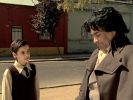Eye For Film >> Movies >> Night Across The Street (2012) Film Review
Night Across The Street
Reviewed by: Jennie Kermode

Musings on dreams, memory and identity abound in this uneven tale based on two short stories by Hernán del Solar. The story centres on Professor Giono (Christian Vadim), an office worker who is on the brink of retirement but who has, he says, always been waiting. Waiting for what? Why, for the man who will come to kill him. There are echoes of Hemingway and Borges in this, and the latter, especially, is recalled by the professor's gradual awareness of himself as more than one person, as a figure who has changed so much over the years that it is difficult to conceive of him as a single entity.
We see him as an old man and we see him as a boy, but it's never certain which we should take as our guide, which we accept as the hub of the film's reality. Is the boy imagining life as an old man, or is the old man remembering the boy? Given the tendency of prediction to mingle with flights of fantasy (the boy discoursing at length with Ludwig Van Beethoven and Long John Silver) and given the unreliability of memory, it's also unclear whether or not we're getting an accurate picture of either. Perhaps it doesn't matter. Perhaps the fuzziness of identity and the subjectivity colouring our experiences is the point.

Underlying this is a darker strand impossible to get away from in a journey through late 20th century Chile, though for the most part the politics and military presence are only hinted at, fascism brushing up against the sides of people's lives rather than overtly overwhelming them. It's dangerous territory for a man who trades in words and ideas, as indeed it was for del Solar himself, and here we see words become weapons like bullets, like marbles, piercing time. Love letters go unanswered and the lovers shift between conflicting personas. Death is coming for everyone, it is noted, but the professor is different because he has always known that. As Chile tries to find its place in the world, reaching out through the cultural networks we see here, is it too shaped by the weight of its losses?
There is a weight of ideas here and they are sometimes too much for the script to bear; it sags in places, in others gives way to bouts of frantic comedy, and tension is lost. It doesn't always seem confident enough in its own convictions to successfully cope with what it has taken on. There are some technical problems too, which betray the low budget, but they are largely compensated for by magnificent set design. It's hard to think of another film which has themed its colour palette around pink in this way and made so much of it. The atmosphere it creates is always about dawn or dusk; we are at the beginning or end of the story, never quite able to grasp what lies in between. There's warm domesticity (magnolia and brown enter the picture here) which comes to feel like a trap or an apology for all that unacknowledged violence. The boy sometimes calls himself Rhodedendro. A secret name; a pink flower; a survivor in high mountains; elsewhere, a troublesome weed.
The cinematography here, though also experiencing moments of weakness, is strong and innovative, making a great deal out of innovative settings and playing with the mechanics of the stage whilst elevating the film beyond that. At the start and at the end, we find ourselves distant, watching from beyond the coast. The swell of the waves threatens to break the spell and it is hard not to think of the fate of the disappeared. Who are we, watching? Who is waiting to be killed?
Reviewed on: 12 Dec 2013

















